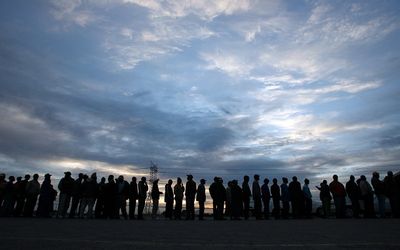ON WEDNESDAY, South Africa votes for a new government that will be dominated by old faces and past events. That South Africa has marked 20 years of democracy invokes nostalgia and national pride among many voters. Many of us still remember the electricity that was in the air when newly elected president Nelson Mandela declared that we were "free at last" at the Union Buildings in May 1994.
Yet these could be the last elections in which the dead hand of the past plays such a big role in determining our future. The grip will be much looser in 2019. Fast forward to two elections from now: today’s grade 4 pupils, who were born a decade after the end of apartheid, will be voting for the first time.
I was thinking about this as I observed the election campaign. For the African National Congress (ANC), the message was an emotional appeal to history, tinged with threats that a vote against the party of liberation could see a return to the apartheid past. Note the constant branding of the Democratic Alliance (DA) as a party of apartheid. The DA spent most of its time attacking the suitability of President Jacob Zuma for high office. The Economic Freedom Fighters (EFF) provided an entertaining diversion by preaching economic freedom for the masses. The other parties made some noise, all of it forgettable.
One big variable that will have a bearing on the 2024 elections will be the changing generational profile of South Africa’s political leadership. Judging by the prominent faces in the ANC campaign, it seems to me that the party might well be presenting many candidates in their 60s, 70s or 80s to the new generation of voters.
These senior comrades may have played some role in the struggle, but in 2024 the struggle would have ended 30 years before. The fact that ANC deputy president Cyril Ramaphosa led a march of mine workers in Johannesburg in 1987 will be irrelevant to 18-year-old voters.
The ANC has started to put forward a handful of its leaders in their 40s, many of whom like repeating the rhetoric of their fathers. Absent a radical generational and programmatic shift within the party over the next few years, by 2024 the party of liberation is likely to resemble a dinosaur as far as today’s 10-year-olds are concerned.
Which brings me to the DA and the EFF. While the two parties hold divergent views, their leaderships on average have a younger profile. The EFF leaders are in their 30s; the DA has a crop of prominent leaders of the same age. The parties’ political messages are more about the present than the past. In 2024, both Mmusi Maimane and Julius Malema will be in their 40s.
Within the trade union movement, there is also a crop of younger workers emerging who are not necessarily beholden to the ANC and the South African Communist Party. For example, the president of the National Union of Metalworkers of South Africa, Andrew Chirwa, was only 14 years old when South Africa held its first democratic elections. The Marikana miners are another example.
Over the next decade, a new generation will make its mark on South African politics. Their outlook will be less about the struggle for freedom and more about today’s struggles.
Despite the chipping away of accountability and efforts to throw the blanket of secrecy and "national security" over greater aspects of government activity, political space remains open in South Africa. As a country, we debate at work, at school, in taxis, on the radio, over supper and in shebeens. We tweet. We even boo the president. This is a great South African tradition. Long live!
So I celebrate that my son and his friends find the campaign posters lining the streets to their school fascinating. They ask questions about Helen Zille, Malema and Zuma. Sometimes they offer advice on who to vote for.
But their reality will be different from ours. Their knowledge of apartheid will be of the textbook variety. Their parents would have lived most of their lives in a free society. They will be voting with their heads, not their hearts.
• Morudu is a Cape Town-based writer.

DEMOCRACY AT DAWN: Voters queue to cast their ballots in the 1994 election. Picture: SUNDAY TIMES
ON WEDNESDAY, South Africa votes for a new government that will be dominated by old faces and past events. That South Africa has marked 20 years of democracy invokes nostalgia and national pride among many voters. Many of us still remember the electricity that was in the air when newly elected president Nelson Mandela declared that we were "free at last" at the Union Buildings in May 1994.
Yet these could be the last elections in which the dead hand of the past plays such a big role in determining our future. The grip will be much looser in 2019. Fast forward to two elections from now: today’s grade 4 pupils, who were born a decade after the end of apartheid, will be voting for the first time.
I was thinking about this as I observed the election campaign. For the African National Congress (ANC), the message was an emotional appeal to history, tinged with threats that a vote against the party of liberation could see a return to the apartheid past. Note the constant branding of the Democratic Alliance (DA) as a party of apartheid. The DA spent most of its time attacking the suitability of President Jacob Zuma for high office. The Economic Freedom Fighters (EFF) provided an entertaining diversion by preaching economic freedom for the masses. The other parties made some noise, all of it forgettable.
One big variable that will have a bearing on the 2024 elections will be the changing generational profile of South Africa’s political leadership. Judging by the prominent faces in the ANC campaign, it seems to me that the party might well be presenting many candidates in their 60s, 70s or 80s to the new generation of voters.
These senior comrades may have played some role in the struggle, but in 2024 the struggle would have ended 30 years before. The fact that ANC deputy president Cyril Ramaphosa led a march of mine workers in Johannesburg in 1987 will be irrelevant to 18-year-old voters.
The ANC has started to put forward a handful of its leaders in their 40s, many of whom like repeating the rhetoric of their fathers. Absent a radical generational and programmatic shift within the party over the next few years, by 2024 the party of liberation is likely to resemble a dinosaur as far as today’s 10-year-olds are concerned.
Which brings me to the DA and the EFF. While the two parties hold divergent views, their leaderships on average have a younger profile. The EFF leaders are in their 30s; the DA has a crop of prominent leaders of the same age. The parties’ political messages are more about the present than the past. In 2024, both Mmusi Maimane and Julius Malema will be in their 40s.
Within the trade union movement, there is also a crop of younger workers emerging who are not necessarily beholden to the ANC and the South African Communist Party. For example, the president of the National Union of Metalworkers of South Africa, Andrew Chirwa, was only 14 years old when South Africa held its first democratic elections. The Marikana miners are another example.
Over the next decade, a new generation will make its mark on South African politics. Their outlook will be less about the struggle for freedom and more about today’s struggles.
Despite the chipping away of accountability and efforts to throw the blanket of secrecy and "national security" over greater aspects of government activity, political space remains open in South Africa. As a country, we debate at work, at school, in taxis, on the radio, over supper and in shebeens. We tweet. We even boo the president. This is a great South African tradition. Long live!
So I celebrate that my son and his friends find the campaign posters lining the streets to their school fascinating. They ask questions about Helen Zille, Malema and Zuma. Sometimes they offer advice on who to vote for.
But their reality will be different from ours. Their knowledge of apartheid will be of the textbook variety. Their parents would have lived most of their lives in a free society. They will be voting with their heads, not their hearts.
• Morudu is a Cape Town-based writer.














 News, views and analysis of South Africa's national and provincial elections on May 7 2014
News, views and analysis of South Africa's national and provincial elections on May 7 2014






Change: -0.47%
Change: -0.57%
Change: -1.76%
Change: -0.34%
Change: 0.02%
Data supplied by Profile Data
Change: -1.23%
Change: -0.37%
Change: -0.47%
Change: 0.00%
Change: -0.42%
Data supplied by Profile Data
Change: 1.29%
Change: 1.53%
Change: 1.22%
Change: 1.10%
Change: 1.28%
Data supplied by Profile Data
Change: 0.04%
Change: -0.52%
Change: 0.20%
Change: -1.38%
Change: -1.73%
Data supplied by Profile Data